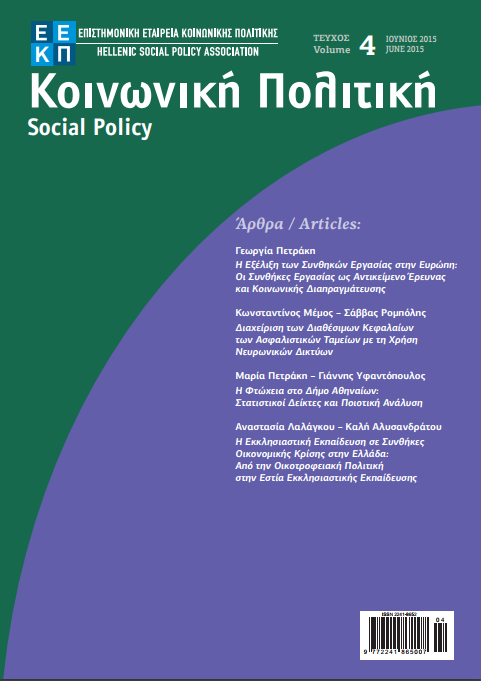Η Εξέλιξη των Συνθηκών Εργασίας στην Ευρώπη: Οι Συνθήκες Εργασίας ως Αντικείμενο Έρευνας και Κοινωνικής Διαπραγμάτευσης

Abstract
The "working conditions" as a research field and as scope of public intervention become an issue in the major industrialized countries as from the 1960's. At present this is a multidisciplinary area of public and academic interest. The initially narrow approach of working conditions (health and safety conditions) gradually expanded to include topics related to the content of work quality and relationships at work, under the pressure created by the expectations for quality of work, which fueled public policies during the full-time employment period. In the last few decades, with the problem of unemployment dominant, the changes in production systems and the problems they create, bring to the fore the problematic nature of modern workplaces and feed the relevant debate. Of the 15 EU Member States, Greece is the only one lacking large-scale survey on working conditions, while even the unions have shown no interest to develop research in the workplace. This paper seeks to explore the field and emphasize the need for public knowledge and understanding of what happens in the workplace, and for systematic research that will feed the social processes and assist to the elaboration of social public policies.
Article Details
- How to Cite
-
Πετράκη Γ. (2017). Η Εξέλιξη των Συνθηκών Εργασίας στην Ευρώπη: Οι Συνθήκες Εργασίας ως Αντικείμενο Έρευνας και Κοινωνικής Διαπραγμάτευσης. Social Policy, 4, 7–18. https://doi.org/10.12681/sp.10594
- Issue
- Vol. 4 (2015)
- Section
- Articles

This work is licensed under a Creative Commons Attribution 4.0 International License.
Authors who publish with this journal agree to the following terms:
Authors retain copyright and grant the journal right of first publication with the work simultaneously licensed under a Creative Commons Attribution Non-Commercial License that allows others to share the work with an acknowledgement of the work's authorship and initial publication in this journal.
Authors are able to enter into separate, additional contractual arrangements for the non-exclusive distribution of the journal's published version of the work (e.g. post it to an institutional repository or publish it in a book), with an acknowledgement of its initial publication in this journal.
Authors are permitted and encouraged to post their work online (preferably in institutional repositories or on their website) prior to and during the submission process, as it can lead to productive exchanges, as well as earlier and greater citation of published work.


